 Dodge Nitro: Climate controls
Dodge Nitro: Climate controls
The Air Conditioning and Heating System is designed to make you comfortable in all types of weather.
Manual Heating and Air Conditioning
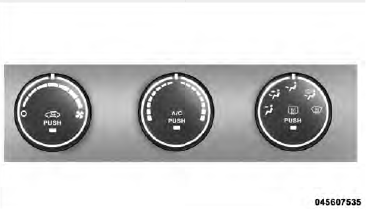
The Manual Temperature Controls consist of a series of outer rotary dials and inner push knobs.
Blower Control
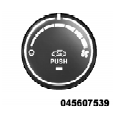 Rotate this control to regulate
the
amount of air forced through the ventilation
system in any mode. The
blower speed increases as you move
the control to the right from the “O”
(OFF) position. There are seven blower
speeds.
Rotate this control to regulate
the
amount of air forced through the ventilation
system in any mode. The
blower speed increases as you move
the control to the right from the “O”
(OFF) position. There are seven blower
speeds.
Temperature Control
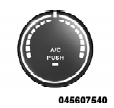 Rotate this control to regulate
the temperature
of the air inside the passenger
compartment. Rotating the dial left
into the blue area of the scale indicates
cooler temperatures while rotating
right into the red area indicates
warmer temperatures.
Rotate this control to regulate
the temperature
of the air inside the passenger
compartment. Rotating the dial left
into the blue area of the scale indicates
cooler temperatures while rotating
right into the red area indicates
warmer temperatures.
NOTE: If your air conditioning performance seems lower than expected, check the front of the A/C condenser located in front of the radiator for an accumulation of dirt or insects. Clean with a gentle water spray from behind the radiator and through the condenser. Fabric front fascia protectors may reduce airflow to the condenser, reducing air conditioning performance.
Mode Control (Air Direction)
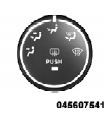 Rotate this control to choose
from several
patterns of air distribution. You
can select either a primary mode as
identified by the symbols on the control,
or a blend of two of these modes.
The closer the setting is to a particular
symbol, the more air distribution you
receive from that mode.
Rotate this control to choose
from several
patterns of air distribution. You
can select either a primary mode as
identified by the symbols on the control,
or a blend of two of these modes.
The closer the setting is to a particular
symbol, the more air distribution you
receive from that mode.
Panel
 Air is directed through the
outlets in the instrument
panel. These outlets can be adjusted to direct airflow.
Air is directed through the
outlets in the instrument
panel. These outlets can be adjusted to direct airflow.
NOTE: The center instrument panel outlets can be aimed so that they are directed toward the rear seat passengers for maximum airflow to the rear.
Bi-Level
 Air is directed through the
panel and floor outlets.
Air is directed through the
panel and floor outlets.
NOTE: For all settings except full cold or full hot, there is a difference in temperature between the upper and lower outlets. The warmer air flows to the floor outlets. This feature gives improved comfort during sunny but cool conditions.
Floor
 Air is directed through the
floor outlets with a
small amount flowing through the defrost and side
window demist outlets.
Air is directed through the
floor outlets with a
small amount flowing through the defrost and side
window demist outlets.
Mix
 Air is directed through the
floor, defrost, and side
window demist outlets. This setting works best in
cold or snowy conditions that require extra heat to
the windshield. This setting is good for maintaining
comfort while reducing moisture on the windshield.
Air is directed through the
floor, defrost, and side
window demist outlets. This setting works best in
cold or snowy conditions that require extra heat to
the windshield. This setting is good for maintaining
comfort while reducing moisture on the windshield.
Defrost
 Air is directed through the
windshield and side
window demist outlets. Use this mode with maximum
blower and temperature settings for best windshield
and side window defrosting.
Air is directed through the
windshield and side
window demist outlets. Use this mode with maximum
blower and temperature settings for best windshield
and side window defrosting.
NOTE: The air conditioning compressor operates in Mix, Defrost, or a blend of these modes, even if the Air Conditioning (A/C) button is not pressed. This dehumidifies the air to help dry the windshield. To improve fuel economy, use these modes only when necessary.
Recirculation Control
 Pressing the Recirculation
Control button will
put the system in recirculation mode. This can
be used when outside conditions such as
smoke, odors, dust, or high humidity are
present. Activating recirculation will cause the LED in the
control button to illuminate. After ten minutes, the system
will return to normal mode function and the LED
will turn off.
Pressing the Recirculation
Control button will
put the system in recirculation mode. This can
be used when outside conditions such as
smoke, odors, dust, or high humidity are
present. Activating recirculation will cause the LED in the
control button to illuminate. After ten minutes, the system
will return to normal mode function and the LED
will turn off.
NOTE:
• Continuous use of the recirculation mode may make
the inside air stuffy and window fogging may occur.
Extended use of this mode is not recommended.
• The use of the recirculation mode in cold or damp
weather will cause windows to fog on the inside,
because of moisture buildup inside the vehicle. Select
the Outside Air position for maximum defogging.
• The A/C will engage automatically to prevent fogging
when the recirculation button is pressed and the mode
control is set to panel or panel / floor.
• The A/C can be deselected manually without disturbing
the mode control selection.
• When the ignition switch is turned to the LOCK
position, the recirculation feature will be cancelled.
Air Conditioning Control
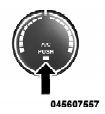 Press this button to engage the
Air
Conditioning. A light will illuminate
when the Air Conditioning System is
engaged. Rotating the dial left into the
blue area of the scale indicates cooler
temperatures while rotating right into
the red area indicates warmer temperatures.
Press this button to engage the
Air
Conditioning. A light will illuminate
when the Air Conditioning System is
engaged. Rotating the dial left into the
blue area of the scale indicates cooler
temperatures while rotating right into
the red area indicates warmer temperatures.
NOTE: The air conditioning compressor will not engage until the engine has been running for about 10 seconds.
• MAX A/C
For maximum cooling use the A/C and recirculation buttons at the same time.
• ECONOMY MODE
If economy mode is desired, press the A/C button to turn OFF the indicator light and the A/C compressor. Then, move the temperature control to the desired temperature.
Automatic Temperature Control (ATC)
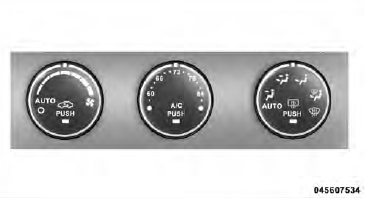 Automatic Temperature Control
Automatic Temperature Control
Automatic Operation
The Automatic Temperature Control system automatically maintains the climate in the cabin of the vehicle at the comfort levels desired by the driver and passenger.
Operation of the system is quite simple. 1. Turn the Mode Control knob (on the right) and the Blower Control knob (on the left) to AUTO.
NOTE: The AUTO position performs best for front seat occupants only.
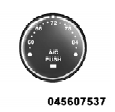 2. Dial in the temperature you
would
like the system to maintain by rotating
the Temperature Control knob. Once
the comfort level is selected, the system
will maintain that level automatically
using the heating system. Should
the desired comfort level require air
conditioning, the system will automatically make the
adjustment.
2. Dial in the temperature you
would
like the system to maintain by rotating
the Temperature Control knob. Once
the comfort level is selected, the system
will maintain that level automatically
using the heating system. Should
the desired comfort level require air
conditioning, the system will automatically make the
adjustment.
You will experience the greatest efficiency by simply allowing the system to function automatically. Selecting the “O” (OFF) position on the blower control stops the system completely and closes the outside air intake. The recommended setting for maximum comfort is 72°F (22°C) for the average person; however, this may vary.
NOTE:
• The temperature setting can be adjusted at anytime
without affecting automatic operation.
• Pressing the Air Conditioning Control button while in
AUTO mode will cause the LED in the control button
to flash three times and then turn off. This indicates
that the system is in AUTO mode and requesting the
air conditioning is not necessary.
• If your air conditioning performance seems lower than
expected, check the front of the A/C condenser located
in front of the radiator for an accumulation of dirt or
insects. Clean with a gentle water spray from behind
the radiator and through the condenser. Fabric front
fascia protectors may reduce airflow to the condenser,
reducing air conditioning performance.
Blower Control
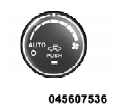 For full automatic operation or
for
automatic blower operation turn the
knob to AUTO position. In manual
mode there are seven blower speeds
that can be individual selected. In off
position the blower will shut off.
For full automatic operation or
for
automatic blower operation turn the
knob to AUTO position. In manual
mode there are seven blower speeds
that can be individual selected. In off
position the blower will shut off.
Manual Operation
This system offers a full complement of manual override features, which consist of Blower Preferred Automatic, Mode Preferred Automatic, or Blower and Mode Preferred Automatic. This means the operator can override the blower, the mode, or both. There is a manual blower range for times when the AUTO setting is not desired. The blower can be set to any fixed blower speed by rotating the Blower Control knob (on the left).
NOTE: Please read the Automatic Temperature Control Operation Chart that follows for details.
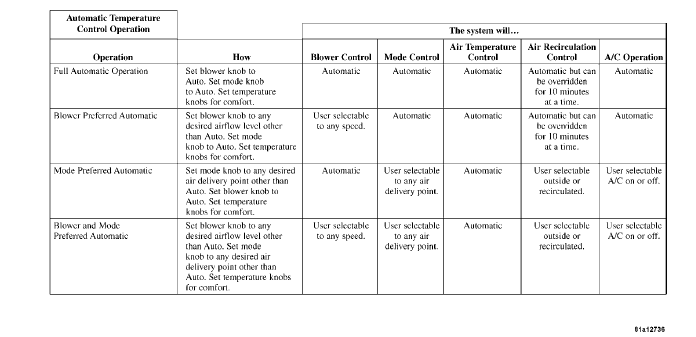
The operator can override the AUTO mode setting to change airflow distribution by rotating the Mode Control knob (on the right) to one of the following positions.
• Panel
 Air is directed through the
outlets in the instrument
panel. These outlets can be adjusted to direct airflow.
Air is directed through the
outlets in the instrument
panel. These outlets can be adjusted to direct airflow.
NOTE: The center instrument panel outlets can be aimed so that they are directed toward the rear seat passengers for maximum airflow to the rear.
• Bi-Level
 Air is directed through the
panel and floor outlets.
Air is directed through the
panel and floor outlets.
NOTE: For all settings except full cold or full hot, there is a difference in temperature between the upper and lower outlets. The warmer air flows to the floor outlets. This feature gives improved comfort during sunny but cool conditions.
• Floor
 Air is directed through the
floor outlets with a
small amount flowing through the defrost and side
window demist outlets.
Air is directed through the
floor outlets with a
small amount flowing through the defrost and side
window demist outlets.
• Mix
 Air is directed through the
floor, defrost, and side
window demist outlets. This setting works best in
cold or snowy conditions that require extra heat to
the windshield. This setting is good for maintaining
comfort while reducing moisture on the windshield.
Air is directed through the
floor, defrost, and side
window demist outlets. This setting works best in
cold or snowy conditions that require extra heat to
the windshield. This setting is good for maintaining
comfort while reducing moisture on the windshield.
• Defrost
 Air is directed through the
windshield and side
window demist outlets. Use this mode with maximum
blower and temperature settings for best windshield
and side window defrosting.
Air is directed through the
windshield and side
window demist outlets. Use this mode with maximum
blower and temperature settings for best windshield
and side window defrosting.
• Air Conditioner Control
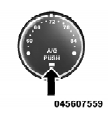 Press this button to turn on the
air
conditioning during manual operation
only. When the air conditioning is
turned on, cool dehumidified air will
flow through the outlets selected with
the Mode control dial. Press this button
a second time to turn OFF the air
conditioning. An LED in the button illuminates when
manual compressor operation is selected.
Press this button to turn on the
air
conditioning during manual operation
only. When the air conditioning is
turned on, cool dehumidified air will
flow through the outlets selected with
the Mode control dial. Press this button
a second time to turn OFF the air
conditioning. An LED in the button illuminates when
manual compressor operation is selected.
• Recirculation Control
 The system will automatically
control recirculation.
However, pressing the Recirculation
Control button will temporarily put the system
in recirculation mode (ten minutes). This can
be used when outside conditions such as smoke, odors,
dust, or high humidity are present. Activating recirculation
will cause the LED in the control button to illuminate.
After ten minutes, the system will return to normal
AUTO mode function and the LED will turn off.
The system will automatically
control recirculation.
However, pressing the Recirculation
Control button will temporarily put the system
in recirculation mode (ten minutes). This can
be used when outside conditions such as smoke, odors,
dust, or high humidity are present. Activating recirculation
will cause the LED in the control button to illuminate.
After ten minutes, the system will return to normal
AUTO mode function and the LED will turn off.
NOTE:
• When the ignition switch is turned to the LOCK
position, the recirculation feature will be cancelled.
• In cold weather, use of the Recirculation mode may
lead to excessive window fogging. The Recirculation
mode is not allowed in the floor, defrost, or defrost/
floor mode in order to improve window clearing.
Recirculation will be disabled automatically if these
modes are selected.
• Extended use of recirculation may cause the windows
to fog. If the interior of the windows begins to fog,
press the Recirculation button to return to outside air.
Some temp/humidity conditions will cause captured
interior air to condense on windows and hamper
visibility. For this reason, the system will not allow
Recirculation to be selected while in floor, defrost, or
defrost/floor mode. Attempting to use the recirculation
while in these modes will cause the LED in the
control button to blink and then turn off.
• Most of the time, when in Automatic Operation, you
can temporarily put the system into Recirculation
Mode by pressing the Recirculation button. However,
under certain conditions, while in Automatic Mode,
the system is blowing air out the defrost vents. When
these conditions are present, and the Recirculation
button is pressed, the indicator will flash and then turn
off. This tells you that you are unable to go into
Recirculation Mode at this time. If you would like the
system to go into Recirculation Mode, you must first
move the Mode knob to Panel, Panel/Floor and then
press the Recirculation button. This feature reduces the
possibility of window fogging.
Operating Tips
NOTE: Refer to the chart at the end of this section for suggested control settings for various weather conditions.
Summer Operation
The engine cooling system in air-conditioned vehicles must be protected with a high-quality antifreeze coolant to provide proper corrosion protection and to protect against engine overheating. A solution of 50% ethylene glycol antifreeze coolant and 50% water is recommended. Refer to “Maintenance Procedures” in “Maintaining Your Vehicle” for proper coolant selection.
Winter Operation
Use of the air Recirculation Mode during winter months is not recommended because it may cause window fogging.
Vacation Storage
Anytime you store your vehicle, or keep it out of service (i.e., vacation) for two weeks or more, run the air conditioning system at idle for about five minutes in the fresh air and high blower settings. This will ensure adequate system lubrication to minimize the possibility of compressor damage when the system is started again.
Window Fogging
Interior fogging on the windshield can be quickly removed by turning the mode selector to Defrost. The Defrost/Floor mode can be used to maintain a clear windshield and provide sufficient heating. If side window fogging becomes a problem, increase blower speed. Vehicle windows tend to fog on the inside in mild but rainy or humid weather.
NOTE: Recirculate without A/C should not be used for long periods as fogging may occur.
Side Window Demisters
A side window demister outlet is located at each end of the instrument panel. These non-adjustable outlets direct air toward the side windows when the system is in the FLOOR, MIX, or DEFROST mode. The air is directed at the area of the windows through which you view the outside mirrors.
Outside Air Intake
Make sure the air intake, located directly in front of the windshield, is free of obstructions such as leaves. Leaves collected in the air intake may reduce airflow, and if they enter the plenum, they could plug the water drains. In winter months, make sure the air intake is clear of ice, slush, and snow.
A/C Air Filter
The A/C Filter prevents most dust and pollen from entering the cabin. The filter acts on air coming from outside the vehicle and recirculated air within the passenger compartment. Refer to “Maintenance Procedures” in “Maintaining Your Vehicle” for A/C Air Filter service information or see your authorized dealer for service. Refer to “Maintenance Schedules” for filter service intervals.
Control Setting Suggestions for Various Weather Conditions
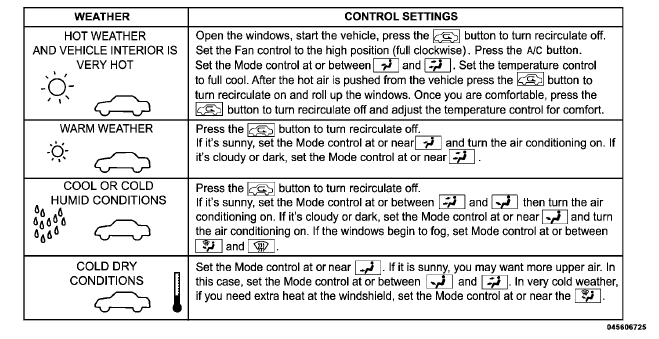
 Radio operation and cellular phones
Radio operation and cellular phones
Under certain conditions, the cellular phone being on in
your vehicle can cause erratic or noisy performance from
your radio. This condition may be lessened or eliminated
by relocating the cellu ...
See also:
Using the radio
...
Maintain a Proper Sitting Position
After all occupants have adjusted
their seats and head restraints, and
put on their seat belts, it is very
important that they continue to sit
upright, well back in their seats, with
their f ...
Emergency towing
See page 282 for more information. ...

